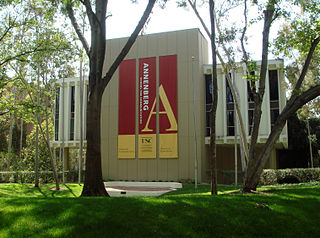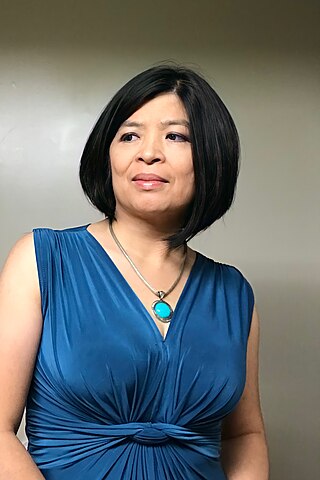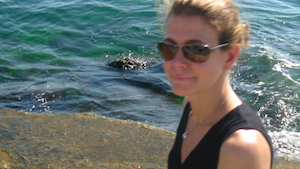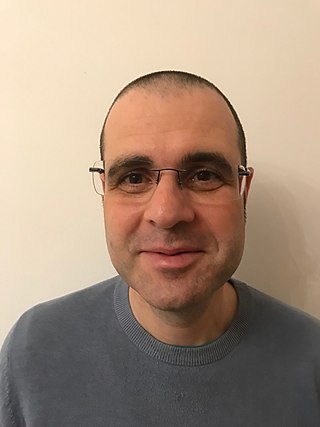
Manuel Castells Oliván is a Spanish sociologist. He is well known for his authorship of a trilogy of works, entitled The Information Age: Economy, Society and Culture. He is a scholar of the information society, communication and globalization.
New media are communication technologies that enable or enhance interaction between users as well as interaction between users and content. In the middle of the 1990s, the phrase "new media" became widely used as part of a sales pitch for the influx of interactive CD-ROMs for entertainment and education. The new media technologies, sometimes known as Web 2.0, include a wide range of web-related communication tools such as blogs, wikis, online social networking, virtual worlds, and other social media platforms.
Mass communication is the process of imparting and exchanging information through mass media to large population segments. It utilizes various forms of media as technology has made the dissemination of information more efficient. Primary examples of platforms utilized and examined include journalism and advertising. Mass communication, unlike interpersonal communication and organizational communication, focuses on particular resources transmitting information to numerous receivers. The study of mass communication is chiefly concerned with how the content and information that is being mass communicated persuades or affects the behavior, attitude, opinion, or emotion of people receiving the information.
Internet studies is an interdisciplinary field studying the social, psychological, political, technical, cultural and other dimensions of the Internet and associated information and communication technologies. The human aspects of the Internet are a subject of focus in this field. While that may be facilitated by the underlying technology of the Internet, the focus of study is often less on the technology itself than on the social circumstances that technology creates or influences.
Online ethnography is an online research method that adapts ethnographic methods to the study of the communities and cultures created through computer-mediated social interaction. As modifications of the term ethnography, cyber-ethnography, online ethnography and virtual ethnography designate particular variations regarding the conduct of online fieldwork that adapts ethnographic methodology. There is no canonical approach to cyber-ethnography that prescribes how ethnography is adapted to the online setting. Instead individual researchers are left to specify their own adaptations. Netnography is another form of online ethnography or cyber-ethnography with more specific sets of guidelines and rules, and a common multidisciplinary base of literature and scholars. This article is not about a particular neologism, but the general application of ethnographic methods to online fieldwork as practiced by anthropologists, sociologists, and other scholars.

The USC Annenberg School for Communication and Journalism comprises a School of Communication and a School of Journalism at the University of Southern California (USC). Starting July 2017, the school's Dean is Willow Bay, succeeding Ernest J. Wilson III. The graduate program in Communication is consistently ranked first according to the QS World University Rankings.
Clemencia Rodriguez is a Colombian US-based media and communication scholar recognized for her role in establishing and promoting the field of alternative media studies in English language media studies, notably through her work on 'citizens' media,' a term she coined in her 2001 book Fissures in the Mediascape and through co-founding and facilitating OURMedia/NUESTROSMedios, a global network of researchers and practitioners of alternative media, community media and citizens' media, currently the biggest network of its kind with over 500 members in over 40 countries.

Merlyna Lim is a scholar studying ICT, particularly on the socio-political shaping of new media in non-Western contexts. She has been appointed a Canada Research Chair in Digital Media and Global Network Society in the School of Journalism and Communication Carleton University. Formerly she was a visiting research scholar at Princeton University's Center for Information Technology Policy and a distinguished scholar of technology and public engagement of the School of Social Transformation Justice and Social Inquiry Program and the Consortium for Science, Policy and Outcomes at Arizona State University. She previously held a networked public research associate position at the Annenberg Center for Communication at the University of Southern California, Los Angeles. She received her PhD, with distinction, from University of Twente in Enschede, Netherlands, with a dissertation entitled @rchipelago Online: The Internet and Political Activism in Indonesia.
John Hartley, , FAHA,, FLSW, ICA Fellow, is an Australian academic and a John Curtin Distinguished Emeritus Professor. He was formerly Professor of Cultural Science and the Director of the Centre for Culture and Technology (CCAT) at Curtin University in Western Australia, and Professor of Journalism, Media and Cultural Studies at Cardiff University. He has published over twenty books about communication, journalism, media and cultural studies, many of which have been translated into other languages. Hartley is an adjunct professor with CCAT.
The School of Communication and Information (SC&I) is a professional school within the New Brunswick Campus of Rutgers, The State University of New Jersey. The school was created in 1982 as a result of a merger between the Graduate School of Library and Information Studies, the School of Communication Studies, and the Livingston Department of Urban Journalism. The school has about 2,500 students at the undergraduate, masters, and doctoral levels, and about 60 full-time faculty.
Terry Flew is an Australian media and communications scholar, and Professor of Digital Communication and Culture in the Department of Media and Communication at the University of Sydney, Australia. He was formerly the Professor and Assistant Dean (Research) in the Creative Industries Faculty at the Queensland University of Technology. He has produced award-winning research in creative industries, media and communications, and online journalism. He is primarily known for his publication, New Media: An Introduction, which is currently in its fourth edition. His research interests include digital media, global media, media policy, creative industries, media economics, and the future of journalism.
Lynn Schofield Clark is an American media critic and scholar whose research focuses on media studies and film studies. She is Distinguished Professor in the Department of Media, Film, and Journalism Studies at the University of Denver. She is author of several books and articles on the role social and visual media play in the lives of diverse U.S. adolescents. In her 2017 book co-authored with Regina Marchi, Young People and the Future of News, Clark and Marchi utilize an ethnographic approach to tell the stories of how young people engage with social media and legacy media both as producers and consumers of news. The book received the 2018 Nancy Baym Book Award from the Association of Internet Researchers and the 2018 James Carey Media Research Award from the Carl Couch Center for Social and Internet Research Clark's book regarding parenting in the digital age is titled The Parent App: Understanding Families in a Digital Age. Clark’s main contributions are in the areas of family media studies, media rich youth participatory action research and the mediatization (media) of world religions.

Sonia Livingstone is a leading British scholar on the subjects of children, media and the Internet. She is Professor of Social Psychology and former head of the Department of Media and Communications at the London School of Economics and Political Science. While Livingstone’s research has evolved since the start of her career in the 1980s, her recent work explores media and communication in relation to society, children and technology. Livingstone has authored or edited twenty-four books and hundreds of academic articles and chapters. She is known for her continued public engagement about her research areas and has advised the UK government, European Commission, European Parliament, UN Committee on the Rights of the Child, OECD, ITU and UNICEF, among others, on children’s internet safety and rights in the digital environment. In 2014, Livingstone was awarded the title of Officer of the Order of the British Empire (OBE) "for services to children and child Internet safety".
Professor Gerard Goggin is an Australian media and communications researcher at the University of Sydney. He has produced award-winning research in disability and media policy alongside other contemporary works on digital technology and cultures.

Adrienne Russell is an American academic whose work focuses on the digital-age evolution of journalism and activist communication. She is currently Mary Laird Wood Professor in the Department of Communication at the University of Washington and co-director with Matt Powers of the department's Center for Journalism, Media and Democracy.
Dal Yong Jin is a media studies scholar. He is Distinguished SFU Professor in the School of Communication at Simon Fraser University, Vancouver, Canada where his research explores digital platforms, digital games, media history, political economy of communication, globalization and trans-nationalization, the Korean Wave, and science journalism. He has published more than 30 books and penned more than 200 journal articles, book chapters, and book reviews. Jin has delivered numerous keynote speeches, conference presentations, invited lectures, and media interviews on subjects such as digital platforms, video games, globalization, transnational culture, and the Korean Wave. Based on his academic performance, he was awarded the Outstanding Scholar Award from the Korean American Communication Association at the KACA 40th Anniversary Conference in 2018, while receiving the Outstanding Research Award from the Deputy Prime Ministry and Minister of the Education of South Korea. He was also awarded ICA Fellow, which is primarily a recognition of distinguished scholarly contributions at the International Communication Association Conference held in Paris in 2022. Jin has been interviewed by international media outlets, including The Wall Street Journal, Elle, New York Times, The Washington Post, NBC, The Guardian, The Vancouver Sun, Chicago Tribune, The Telegraph, Wired, LA Times, and China Daily as one of the world’s leading scholars on Korean pop culture and these subject matters.
Accelerated pluralism is a theory coined by Bruce Bimber which claims that "the net is accelerating the process of issue group formation and action". As a method of mobilization, it relies on information communication technologies (ICT), particularly the Internet as a tool to promote all kinds of ideological projects or to form social movements. Bimber based his theory on the idea that "the processes of group-oriented politics will show less coherence and less correspondence with established private and public institutional structures".

Christian Fuchs is an Austrian social scientist. From 2013 until 2022 he was Professor of Social Media and Professor of Media, Communication & Society at the University of Westminster, where he also was the Director of the Communication and Media Research Institute (CAMRI). Since 2022, he is Professor of Media Systems and Media Organisation at Paderborn University in Germany. He also known for being the editor of the open access journal tripleC: Communications, Capitalism & Critique. The journal's website offers a wide range of critical studies within the debate of capitalism and communication. This academic open access journal publishes new articles, special issues, calls for papers, reviews, reflections, information on conferences and events, and other journal specific information. Fuchs is also the co-founder of the ICTs and Society-network which is a worldwide interdisciplinary network of researchers who study how society and digital media interact. He is the editor of the Open Access Book Series "Critical, Digital and Social Media Studies" published by the open access university publishing house University of Westminster Press that he helped establish in 2015.
Lilie Chouliaraki is a professor in Media and Communications at the London School of Economics and Political Sciences (LSE). Chouliaraki’s main area of research is the mediation of human vulnerability and suffering. She empirically explores how the media affects our moral and political relationships with distant others in the sense that it affects how we see the vulnerability of other people and how we are asked to feel, think and act toward them.

Tony D. Sampson is a British academic author who writes about philosophies of affect, digital media cultures and labour, marketing power, design/brand thinking, social and immersive user experiences and neurocultures. He is best known for his widely cited and debated academic publications on virality, network contagion and neuroculture. This work is influenced by the 19th century French sociologist, Gabriel Tarde and concerns contemporary analyses of viral phenomena and affective and emotional contagion on the Internet. In 2017 Sampson published The Assemblage Brain, a book about the culture of the affective brain explored through digital media, the neurosciences, business (marketing), cybernetics and political power. His most recent publication, A Sleepwalker's Guide to Social Media (2020), explores the power dynamic of a post-Cambridge Analytica social media environment wherein the marketing logic of virality/growth helps to inflame contagions of race hate, posing a threat to democracy.







